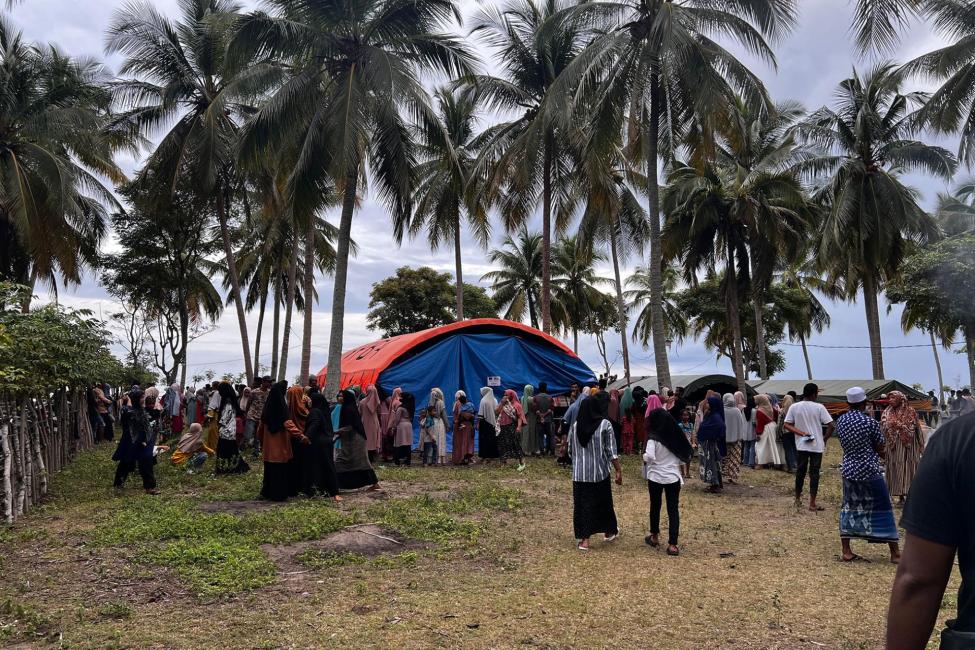-
Who we are
WHO WE AREThe International Organization for Migration (IOM) is part of the United Nations System as the leading inter-governmental organization promoting since 1951 humane and orderly migration for the benefit of all, with 175 member states and a presence in over 100 countries. IOM joined the United Nations system in September 2016.
About
About
IOM Global
IOM Global
-
Our Work
Our WorkAs the leading inter-governmental organization promoting humane and orderly migration, IOM plays a key role to support the achievement of the 2030 Agenda through different areas of intervention that connect both humanitarian assistance and sustainable development.
Cross-cutting (Global)
Cross-cutting (Global)
- Data and Resources
- Take Action
- 2030 Agenda
IOM Calls for Increased Support and Lasting Solutions to Rohingya Refugees Crisis, Five Years On
Geneva – The International Organization for Migration (IOM) calls on the international community to take urgent action to ensure long-term development and sustainable humanitarian assistance for Rohingya refugees and host communities. August 25 marks five years since the first of hundreds of thousands of Rohingya men, women, boys, and girls fled violence and persecution in Myanmar and sought refuge in what is now the world’s largest refugee settlement in Cox’s Bazar, Bangladesh.
Nearly 1 million refugees remain in congested camps. More than half of them are children. Although Bangladesh has generously hosted Rohingya refugees for the last five years, one country cannot and should not bear this responsibility alone.
International and local humanitarian actors must continue to support the response led by the Government of Bangladesh to enable the Rohingya to live a dignified life while in displacement.
The Rohingya themselves have played a central role in the humanitarian response. From volunteering to support fire and cyclone response to door-to-door outreach to raise awareness of COVID-19 prevention measures, the community has led efforts across the camps to support each other. As the crisis has become protracted, they should be further empowered through expanded access to education, skills development and livelihoods.
With limited access to earn a living, Rohingya refugees in Bangladesh remain fully reliant on humanitarian assistance. Groups or persons with specific needs, such as persons with disabilities, female-headed households, or people without access to livelihood opportunities, reported the most significant unmet needs, leaving them vulnerable to negative coping strategies, such as human smuggling and trafficking.
Criminal trafficking networks employ different tactics to lure refugees to work outside the camp and abroad using false pretenses, coercion and abduction. As the lead agency on counter-trafficking in Cox’s Bazar, IOM has identified and assisted more than 1,300 victims of trafficking.
With the current monsoon season already causing historic flooding in northeastern Bangladesh, heavy rainfall where the camps are located could pose further hazards to the Rohingya in their temporary homes made from tarpaulin sheets and bamboo. In 2021, heavy monsoon rains in the camps caused immense flooding incidents that affected nearly 30,000 people; 19,000 were once again displaced and lost their homes.
The Government of Bangladesh along with IOM and humanitarian partners deliver life-saving aid and basic services. IOM continues to provide shelter, protection, mental health and psychosocial services, and water and hygiene support. IOM also implements disaster risk reduction initiatives to mitigate the impacts of climate change in Bangladesh.
***
For more information, please contact:
In Geneva: Safa Msehli, Tel. +41 79 403 55 26 Email: smsehli@iom.int
In Bangkok: Itayi Viriri, Tel: +66 65 939 0934, Email: iviriri@iom.int
